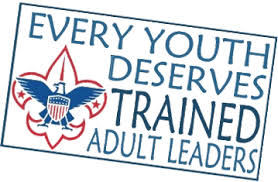 Whether you are a first time adult leader or have been in Scouting for several years, training is one of the most important aspects of being an adult leader. Scouting BSA has a wide range of trainings, both mandatory and voluntary. Each is designed with you in mind; the volunteer. We offer a variety of trainings online, while others are best in person.
Whether you are a first time adult leader or have been in Scouting for several years, training is one of the most important aspects of being an adult leader. Scouting BSA has a wide range of trainings, both mandatory and voluntary. Each is designed with you in mind; the volunteer. We offer a variety of trainings online, while others are best in person.
ALL adult leaders, parents, charter partners, merit badge counselors, and professional staff are required to take Youth Protection Training. True youth protection can be achieved only through the focused commitment of everyone in Scouting. It is the mission of Youth Protection volunteers and professionals to work within Scouts BSA to maintain a culture of Youth Protection awareness and safety at the national, regional, area, council, district, and unit levels.
The “three R’s” of Youth Protection
The “three R’s” of Youth Protection convey a simple message for the personal awareness of our youth members:
- Recognize that anyone could be a molester.
- Respond when someone is doing something that goes against your gut or against the safety guidelines.
- Report attempted or actual molestation or any activity that you think is wrong to a parent or other trusted adult.
Youth Protection Reporting Procedures for Volunteers
There are two types of Youth Protection–related reporting procedures all volunteers must follow:
- When you witness or suspect any child has been abused or neglected—See “Mandatory Report of Child Abuse” below.
- When you witness a violation of the BSA’s Youth Protection policies—See “Reporting Violations of BSA Youth Protection Policies” below.
Mandatory Report of Child Abuse
All persons involved in Scouting shall report to local authorities any good-faith suspicion or belief that any child is or has been physically or sexually abused, physically or emotionally neglected, exposed to any form of violence or threat, exposed to any form of sexual exploitation, including the possession, manufacture, or distribution of child pornography, online solicitation, enticement, or showing of obscene material. You may not abdicate this reporting responsibility to any other person.
Steps to Reporting Child Abuse
- Ensure the child is in a safe environment.
- In cases of child abuse or medical emergencies, call 911 immediately. In addition, if the suspected abuse is in the Scout’s home or family, you are required to contact the local child abuse hotline.
- Notify the Scout executive or his/her designee.
Reporting Violations of BSA Youth Protection Policies
If you think any of the BSA’s Youth Protection policies have been violated, including those described within Scouting’s Barriers to Abuse, you must notify your local council Scout executive or his/her designee so appropriate action can be taken for the safety of our Scouts.
Training Calendar
Click on any card to learn more about upcoming trainings. You can filter to search by district or the whole council.


